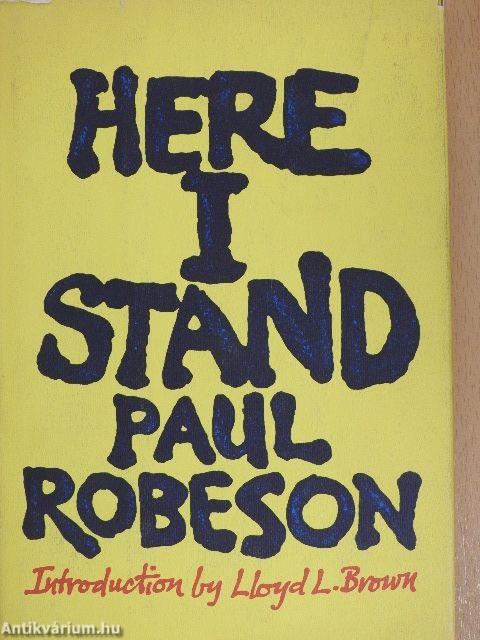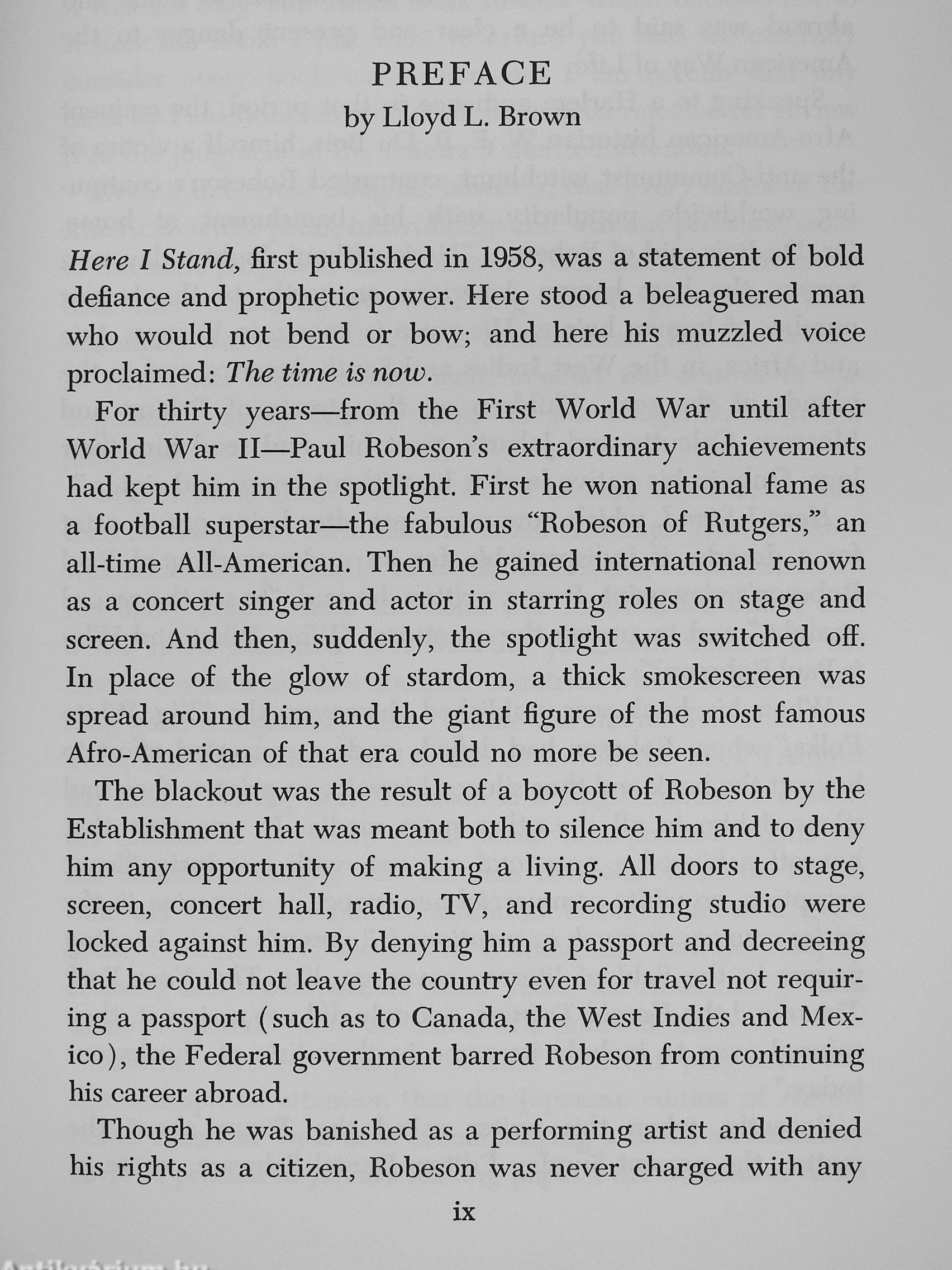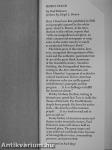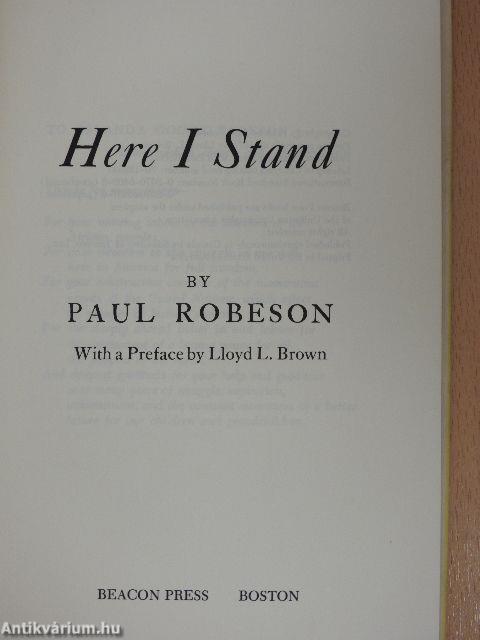1.067.053
kiadvánnyal nyújtjuk Magyarország legnagyobb antikvár könyv-kínálatát

VISSZA
A TETEJÉRE
JAVASLATOKÉszre-
vételek
Here I Stand
| Kiadó: | Beacon Press |
|---|---|
| Kiadás helye: | Boston |
| Kiadás éve: | |
| Kötés típusa: | Félvászon |
| Oldalszám: | 119 oldal |
| Sorozatcím: | |
| Kötetszám: | |
| Nyelv: | Angol |
| Méret: | 21 cm x 15 cm |
| ISBN: | 0-8070-6406-8 |
naponta értesítjük a beérkező friss
kiadványokról
naponta értesítjük a beérkező friss
kiadványokról
Előszó
TovábbFülszöveg
^ 1 lllfl !.T
'v'f ( 71 • I s'li
miym
, C M i'fM
¦Msym
<4/1" Ik'./
Wli u' i f 1-, 'k !'
HERE I STAND
by Paul Robeson preface by Lloyd L. Brown
Here I Stand was first published in 1958 and promptly ignored by the white press. Lloyd L. Brown, in his introduction to this edition, reports that "with one insignificant exception, no white commercial newspaper or magazine in the entire country so much as mentioned Robeson's Book."
The black press of the nation, however, recognized the importance of the work and the authentic, passionate tone of one of the great black Americans of the twentieth century. Saunders Redding, the distinguished historian, writing in the Afro-American, saw Here I Stand as "a program of action for colored Americans. But no American of whatever color can really quarrel with Robeson's principles and his program It is a challenge to fulfill the American dream."
Shirley Graham Du Bois, writing in Mainstream, noted that "love is really the theme of this... Tovább
Fülszöveg
^ 1 lllfl !.T
'v'f ( 71 • I s'li
miym
, C M i'fM
¦Msym
<4/1" Ik'./
Wli u' i f 1-, 'k !'
HERE I STAND
by Paul Robeson preface by Lloyd L. Brown
Here I Stand was first published in 1958 and promptly ignored by the white press. Lloyd L. Brown, in his introduction to this edition, reports that "with one insignificant exception, no white commercial newspaper or magazine in the entire country so much as mentioned Robeson's Book."
The black press of the nation, however, recognized the importance of the work and the authentic, passionate tone of one of the great black Americans of the twentieth century. Saunders Redding, the distinguished historian, writing in the Afro-American, saw Here I Stand as "a program of action for colored Americans. But no American of whatever color can really quarrel with Robeson's principles and his program It is a challenge to fulfill the American dream."
Shirley Graham Du Bois, writing in Mainstream, noted that "love is really the theme of this book. For Paul Robeson deeply loves people. He loves his native land—'the America of the common people' It is a book to read and to pass on and on."
In any history of American music and theater in the twentieth century, Paul Robeson's name will always hold an honored place. The great singer and actor achieved worldwide fame because of his magnificent voice, commanding presence, and great talent.
(continued on back flap)
But there is another facet to his life, beautifully exemplified in Here I Stand. Always an advocate of his fellow blacks and one of the first to study and celebrate the richness of African cultures, his pohtical and social views became so abhorrent to the United States Government that from 1950 until 1958 Mr. Robeson was not allowed to have an American passport.
The government's position in 1952 was made clear in a legal brief to an appellate court when it said that failure to grant a passport to Mr. Robeson "would not amount to an abuse of discretion in view of appellant's frank admission that he had been for years extremely active politically in behalf of independence of the colonial people of Africa."
Mr. Robeson comments: "This attitude of the State Department should outrage every decent American, because the tradition of our country (which was itself born in a great revolution of colonies against alien rule) haS always favored the concept that just government can exist only with the consent of the governed. For Negroes, the State Department's viewpoint must have even greater significance. When I, as a Negro American, can be restricted and charged with having acted against the 'best interests of the United States' by working in behalf of African liberation, some very important questions arise: What are the best interests of Negro Americans in this matter? Can we oppose White Supremacy in South Carolina and not oppose that same vicious system in South Africa?"
Jt'.-.i,
vy / i
%
'li
h
Vissza
Témakörök
- Idegennyelv > Idegennyelvű könyvek > Angol > Művészetek > Film
- Idegennyelv > Idegennyelvű könyvek > Angol > Művészetek > Színház
- Idegennyelv > Idegennyelvű könyvek > Angol > Művészetek > Zene
- Idegennyelv > Idegennyelvű könyvek > Angol > Szépirodalom > Regény, novella, elbeszélés
- Sport > Labdajátékok > Egyéb
- Sport > Sporttörténet > Egyéb
- Szépirodalom > Regény, novella, elbeszélés > Az író származása szerint > Amerika > Amerikai Egyesült Államok
- Szépirodalom > Regény, novella, elbeszélés > Tartalom szerint > Társadalmi csoportok > Kisebbségek > Egyéb
- Művészetek > Zene > Könnyűzene > Stílusok > Musical
- Művészetek > Zene > Könnyűzene > Zenei élet > Interjúk, művészportrék
- Művészetek > Film > Interjúk, vallomások
- Művészetek > Film > Filmtörténet > Országok szerint > Külföldi > Amerikai
- Művészetek > Film > Idegen nyelv > Angol
- Művészetek > Színház > Színháztörténet > Külföldi
- Művészetek > Színház > Idegen nyelv > Angol
- Idegennyelv > Idegennyelvű könyvek > Angol > Sport > Egyéb
- Szépirodalom > Regény, novella, elbeszélés > Tartalom szerint > Életrajzi regények > Önéletrajzok, naplók, memoárok













